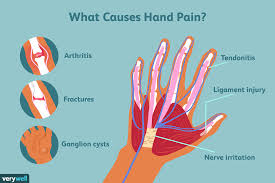If you've ever woken up in the middle of the night with a tingling sensation or found your hands have gone numb, you're not alone. Hand numbness can be a common issue, but understanding the causes and solutions can help you find relief. In this article, we'll explore why your hands might feel numb, especially when you're sleeping, and what you can do about it.
Waking up with numb hands can be unsettling, but there are several reasons this might happen. One of the most common causes is pressure on the nerves, which can occur when you sleep in certain positions. If you lie on your arm or hand, it can compress the nerves and restrict blood flow, causing numbness.
Other Causes of Hand Numbness
Several other factors can contribute to numb hands, including:
-
Carpal Tunnel Syndrome: This condition occurs when the median nerve, which runs through the wrist, becomes compressed. It can lead to numbness and tingling in the fingers.
-
Diabetes: High blood sugar levels can damage nerves over time, leading to numbness, especially in the extremities. This is known as diabetic neuropathy.
-
Vitamin Deficiencies: Lack of certain vitamins, such as Vitamin B12, can cause nerve damage and result in numbness.
-
Injury: An injury to the arm, wrist, or hand can impact nerves and lead to numbness.
-
Repetitive Motion: Activities that involve repetitive hand movements can strain nerves and lead to numbness.
Understanding Specific Types of Numbness
Numbness in Right Hand Fingers
If you experience numbness specifically in the fingers of your right hand, it might be due to repetitive tasks, like typing or using a mouse. Carpal tunnel syndrome often affects the dominant hand first.
Left Hand Small Finger Numbness
Numbness in the small finger of the left hand can be due to ulnar nerve compression. This nerve runs from the neck to the hand and can be compressed at the elbow or wrist, leading to numbness.
Numbness in the Tips of Fingers
Numbness in the fingertips can be a sign of circulation issues or nerve compression. It's important to monitor this symptom, especially if it persists or worsens.
Hand Numbness Remedy
Fortunately, there are several ways to relieve hand numbness. Here are some practical tips:
Adjust Your Sleeping Position
Changing how you sleep can help prevent numbness. Try sleeping on your back or side with your arms in a natural, relaxed position. Avoid sleeping on your hands or arms.
Stretch and Exercise
Regular stretching and strengthening exercises for the hands and wrists can improve circulation and reduce nerve compression. Consider exercises like wrist flexor stretches and finger bends.
Use Supportive Footwear
While it might seem unrelated, wearing supportive footwear can improve your overall posture and reduce strain on your nerves, which can help alleviate numbness. Diabetic shoes or therapeutic shoes are designed to provide extra support and reduce pressure points.
Manage Underlying Conditions
If your numbness is due to an underlying condition like diabetes or a vitamin deficiency, it's essential to manage these issues. Work with your healthcare provider to maintain healthy blood sugar levels or address any nutritional gaps.
Ergonomic Adjustments
If your numbness is related to repetitive tasks, consider making ergonomic adjustments. Use an ergonomic keyboard and mouse, and ensure your workspace is set up to reduce strain on your hands and wrists.
When to See a Doctor
While occasional numbness might not be a cause for concern, there are times when you should seek medical advice. Consult a doctor if:
-
The numbness is frequent.
-
You experience weakness in your hand or arm.
-
The numbness is accompanied by pain.
-
You have difficulty with daily tasks due to numbness.
Conclusion
Hand numbness can be uncomfortable and disruptive, but understanding its causes and solutions can help you find relief. Whether it's adjusting your sleeping position, incorporating exercises, or addressing underlying health issues, there are steps you can take to reduce numbness and improve your quality of life. If symptoms persist, don't hesitate to seek medical advice to ensure there are no serious underlying conditions. Remember, taking proactive steps now can prevent more significant issues down the line.








